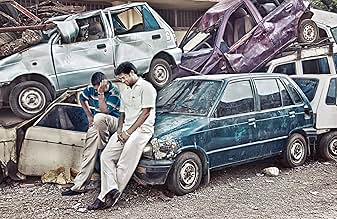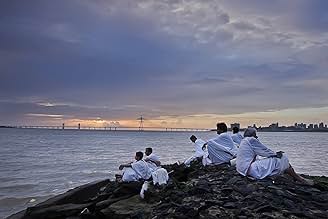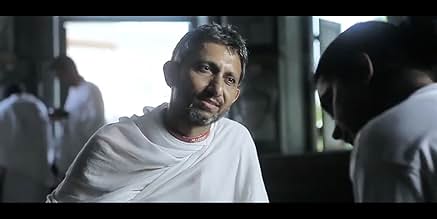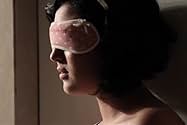IMDb-BEWERTUNG
8,0/10
8160
IHRE BEWERTUNG
Der Film untersucht Fragen nach Identität, Gerechtigkeit, Schönheit, Sinn und Tod am Beispiel einer experimentellen Fotografin, eines kranken Mönchs und eines jungen Börsenmaklers.Der Film untersucht Fragen nach Identität, Gerechtigkeit, Schönheit, Sinn und Tod am Beispiel einer experimentellen Fotografin, eines kranken Mönchs und eines jungen Börsenmaklers.Der Film untersucht Fragen nach Identität, Gerechtigkeit, Schönheit, Sinn und Tod am Beispiel einer experimentellen Fotografin, eines kranken Mönchs und eines jungen Börsenmaklers.
- Auszeichnungen
- 12 Gewinne & 13 Nominierungen insgesamt
Aydah El-Kashef
- Aliya
- (as Aida El-Kashef)
Yogesh Shah
- Doctor
- (as Dr. Yogesh Shah)
Empfohlene Bewertungen
If one has got his/her basics in the right place, whatever is churned out (even if art) automatically scores good while transition from good to great is left to the creativity and imagination involved."Ship of Theseus" does exactly so and not only gets the basics right but also excels in each of them.With mind-blowing cinematography (How cud that be a DSLR?!!!!!), super-crisp editing,superb screenplay,superlative acting (Neeraj Kabi & Sohum Seth take a bow!!!!),music (that song in the monk story was simply amazing) and even comic reliefs there's not much room left for complaints. Now, coming to the gray area of creativity or whatever you call it, "Ship of Theseus" also scores (high enough) but may be not as seamless as its basics (off course IMO).The biggest positive that it has is not being either emotionally or intellectually manipulative.Its a treat to watch a film which is straight enough, with not much hidden in layers and yet so very subtle.Its left for the viewers to perceive once the film ends and continue the journey within.With so many chances that the director could have taken to succumb to push emotional epiphany he never compromises,not even in last reel.And once you know that the same man was involved behind "Kyunki Saas Bhi..." you understand what transformation/compromise(?) means as depicted in the film itself.To talk about drawbacks I found the film lacking in its background score.Not that the realtime sounds as in docu-feature style or absence of constant music is a problem.But more than often it doesn't do justice to the exemplary visuals or images that we see on screen.Those lash green grasses,the centipede movement,the array of photographs,the monk in white walking in rain or through huge sewage lines on both sides with black water flowing below-all of these scenes demanded some musical piece behind.The piece that would bind the film together.Also,of the three stories rather storeys only the first justifies the title while the other two are deeper and close.Yes,though it meets all regular and expected requirements, "Ship of Theseus" could have had a few more exciting requirements to its name.You can't complain,you can only wish and also wish more films like this gets a theatrical release and get the required backing (Thanks Kiran Rao).I am not sure whether this will be a life-changing film for all as selected by the Critics Circle,UK But as inspite of Neeraj Kabi,Aida El-Kashef,Vinay shukla,Sohum Seth and almost everyone else giving of Mr.Mehta (don't know the actor's name) that will stay with me for all as did the father in "A Separation", "Ship Of Theseus" also has every chance to stay with you for long.
Anand Gandhi's SHIP OF THESEUS is in one sentence an amazing story, amazingly shot. One rarely came across a film where narrative is powerful but the visuals add a whole new subtext, a new dimension to the overall experience. Without being too arty, intellectual or surreal, it is an original piece of cinema, where there are moments when you wish your characters to stay silent and they get into arguments and when you expect them to say the things, they stay silent yet speak a lot. It is a classic example of a wonderful use of the language of cinema. It engages your mind provided you have not left it at your home to watch a mindless entertainer. It is intense, sensitive thus overall a rare gem of cinema. Overall Good.
Anand Gandhi's first feature-length film is an intriguing and thought-provoking piece of Independent cinema; it deals with life, purpose and philosophy. Gandhi's prior experience with short films helps him direct the three disparate story lines with certain finesse; the stories shed some light on Theseus's Paradox and give a transcendent look at consequences arising from individual actions.
In Greek Legend, according to Plutarch, Theseus's ship was preserved, and the decayed parts were replaced piece by piece until no part of the original ship remained. Plutarch asks whether you would call it the same ship or not. The paradox might seem too confusing to discuss, but Anand Gandhi just uses this to connect the three plots through the theme of organ donation, questioning identity in the face of change. Rather than making a statement, Gandhi just raises interest and discusses various important philosophies and issues; having compelling arguments for and against the topics, it helps us being a part of the discussion.
The characters are likable and interesting. All the actors have done a commendable job, and Neeraj Kabi's brilliant performance as the Jain monk stands out. As the three stories go, the first one (with the blind Egyptian photographer) deals with behaviour to change, the second one (with the animal-rights supporting Jain monk) might seem more philosophically and intellectually orgasmic, but it's the third one (with a stock broker seeking justice for a kidney scam victim) which oozes with brutal honesty. The use of humour to lighten the serious tone of the movie is delightful.
The cinematography is spectacular. Rarely have I seen such breathtaking visuals in an Independent film; the shots have a certain poetic and aesthetic charm. The blend of far-off shots and sudden close-ups gives us an intimate look at the characters' lives.
The movie is really good, but far from perfection. 2 hours 20 minutes is too long for the movie; with better editing, it could have maintained the pace and momentum well. And as most movies with multiple story lines suffer from this, the characters lack enough depth and screen-time for us to invest ourselves in them. The first story, though the idea of a blind photographer is a bit far-fetched, suffers from an abrupt ending. The second story has many interesting viewpoints and arguments, but part of them seem off-the-book and pretentious; it suffers from an illogical ending too. The third story, though quite honest and absorbing, is quite messy and detours from the main theme of the movie.
From writing screenplay and dialogues for cheesy soap operas to an intellectual independent feature film, Anand Gandhi has come a long way; I guess his experience as a playwright and short-film director must have come in handy.
In Greek Legend, according to Plutarch, Theseus's ship was preserved, and the decayed parts were replaced piece by piece until no part of the original ship remained. Plutarch asks whether you would call it the same ship or not. The paradox might seem too confusing to discuss, but Anand Gandhi just uses this to connect the three plots through the theme of organ donation, questioning identity in the face of change. Rather than making a statement, Gandhi just raises interest and discusses various important philosophies and issues; having compelling arguments for and against the topics, it helps us being a part of the discussion.
The characters are likable and interesting. All the actors have done a commendable job, and Neeraj Kabi's brilliant performance as the Jain monk stands out. As the three stories go, the first one (with the blind Egyptian photographer) deals with behaviour to change, the second one (with the animal-rights supporting Jain monk) might seem more philosophically and intellectually orgasmic, but it's the third one (with a stock broker seeking justice for a kidney scam victim) which oozes with brutal honesty. The use of humour to lighten the serious tone of the movie is delightful.
The cinematography is spectacular. Rarely have I seen such breathtaking visuals in an Independent film; the shots have a certain poetic and aesthetic charm. The blend of far-off shots and sudden close-ups gives us an intimate look at the characters' lives.
The movie is really good, but far from perfection. 2 hours 20 minutes is too long for the movie; with better editing, it could have maintained the pace and momentum well. And as most movies with multiple story lines suffer from this, the characters lack enough depth and screen-time for us to invest ourselves in them. The first story, though the idea of a blind photographer is a bit far-fetched, suffers from an abrupt ending. The second story has many interesting viewpoints and arguments, but part of them seem off-the-book and pretentious; it suffers from an illogical ending too. The third story, though quite honest and absorbing, is quite messy and detours from the main theme of the movie.
From writing screenplay and dialogues for cheesy soap operas to an intellectual independent feature film, Anand Gandhi has come a long way; I guess his experience as a playwright and short-film director must have come in handy.
I went for the movie with nil expectations though i was aware of the genre. But it impressed me beyond excellence at the end. The movie presents three stories seemingly different from one another but the way the different threads of the stories get intertwined at the end into one beautiful fabric is an absolute pleasure to the senses. As per me I perceived there were multiple layers to the story each layer contributing as an example in some way to the ship of theseus paradox. The way in which it subtly presents the fact that if something changes in us, we do not remain the same person from thereon. This change may be a change in the way we perceive the world, or a change in our belief system , or a change in our attitude towards other people. The next layer of the story is what amazed me most , which consists of bringing the three stories together to show how a human being is not just flesh and bones but comprises of ideas, emotions, beliefs etc. What makes each one of us different is our thought process, our ideas, our choices and many other things. A very simple example to state such theory could be a case of twins who share the same progeny, the some womb, the same features but end up completely different. I guess i have already said a lot, if your brain has a good appetite for thought this is the movie for you.
Review #2.
Ship of Theseus is a very different cinematic experience. It moves you, it makes you think about life in a different way. The characters, the narrative don't ever leave you. Anand Gandhi is definitely a talent to look out for.
There are three different stories. Each with a different plot but same destination. The first one brings you in life of a girl who had lost her eyesight due to cornea and does photography. The second one is about a monk who should have an organ transplant. And the third one is about a stockbroker who just had a kidney transplant.
The stories instantaneously connect with you. It's hard to decide which one of the three is the best. I would say the three altogether make one of the finest movies ever made in India. And it would not be wrong to say that it is the best Indian movie of the year.
The performances are very real. Specially Neeraj Sir. The direction and cinematography are exceptional.
At last, I would like to say that It is not a usual Indian movie. Go with your brains and you'll experience something you've never experienced before.
Ship of Theseus is a very different cinematic experience. It moves you, it makes you think about life in a different way. The characters, the narrative don't ever leave you. Anand Gandhi is definitely a talent to look out for.
There are three different stories. Each with a different plot but same destination. The first one brings you in life of a girl who had lost her eyesight due to cornea and does photography. The second one is about a monk who should have an organ transplant. And the third one is about a stockbroker who just had a kidney transplant.
The stories instantaneously connect with you. It's hard to decide which one of the three is the best. I would say the three altogether make one of the finest movies ever made in India. And it would not be wrong to say that it is the best Indian movie of the year.
The performances are very real. Specially Neeraj Sir. The direction and cinematography are exceptional.
At last, I would like to say that It is not a usual Indian movie. Go with your brains and you'll experience something you've never experienced before.
Wusstest du schon
- WissenswertesDirector Anand Gandhi uploaded the original film and 6-hour long extra feature online in November, 2013 asking individuals or entities to edit and carve the film as a whole to bring different interpretations. He would later conduct a festival in Mumbai for the entries.
- Patzer20:50 scene is unreal. Post-op eye opening is done in a dark room so as to prevent strain on eyes.
- VerbindungenFeatured in The Story of Film: A New Generation (2021)
Top-Auswahl
Melde dich zum Bewerten an und greife auf die Watchlist für personalisierte Empfehlungen zu.
Details
- Erscheinungsdatum
- Herkunftsländer
- Offizieller Standort
- Sprachen
- Auch bekannt als
- Корабль Тесея
- Drehorte
- Produktionsfirmen
- Weitere beteiligte Unternehmen bei IMDbPro anzeigen
Box Office
- Budget
- 12.000.000 ₹ (geschätzt)
- Laufzeit
- 2 Std. 20 Min.(140 min)
- Farbe
- Seitenverhältnis
- 2.35 : 1
Zu dieser Seite beitragen
Bearbeitung vorschlagen oder fehlenden Inhalt hinzufügen












